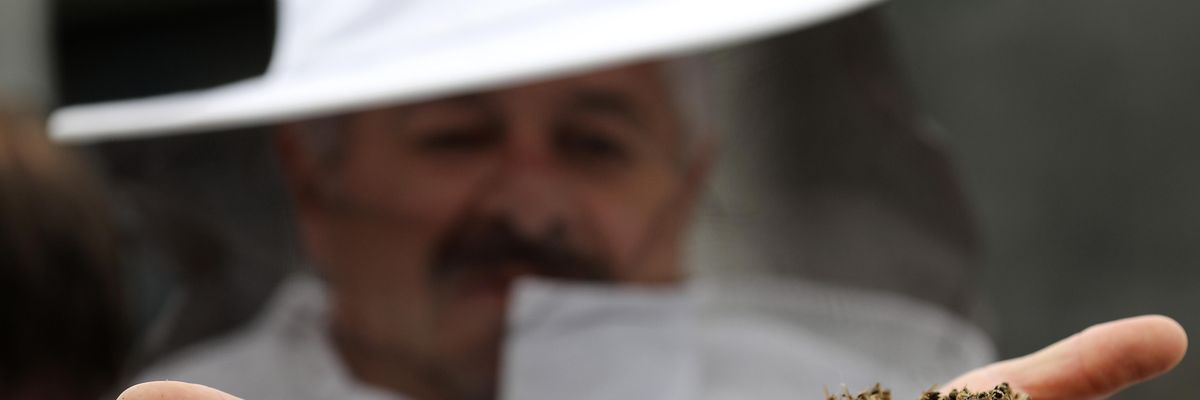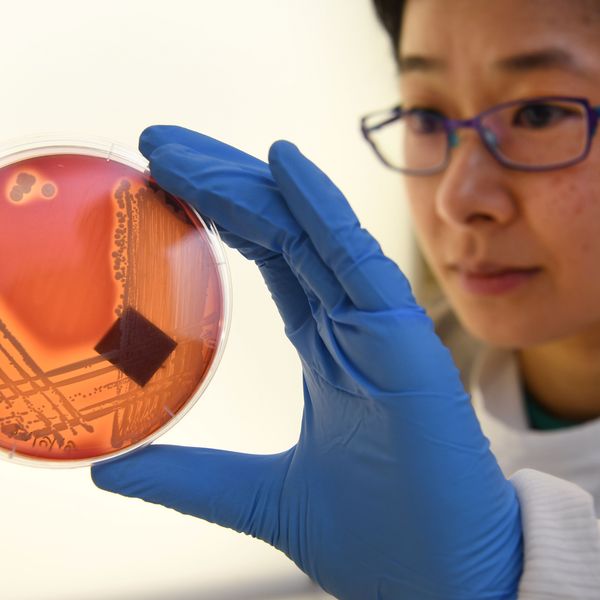
A beekeeper shows dead bees at a protest against the manufacture of harmful chemicals by agrochemical companies on April 26, 2019 in North Rhine-Westphalia, Germany. (Photo: Oliver Berg/dpa/picture alliance via Getty Images)
EPA Sued Over Refusal to Close Deadly Pesticide Loophole Decimating Honey Bees
"While EPA fiddles, grave harm to bees and other pollinators continues," said one advocacy group.
After waiting nearly five years for the Environmental Protection Agency to respond to a petition calling for the closing of a regulatory loophole which has proven deadly for honey bee colonies--spelling disaster for farmers' crops, food security, and biodiversity--two advocacy groups are suing the agency and demanding officials take immediate action to end the use of harmful pesticides known as neonics.
Joined by Pesticide Action Network (PAN) North America, the Center for Food Safety (CFS) filed the lawsuit saying the petition it sent to the EPA in April 2017 regarding the continued use of neonics, or neonicotinoids, provided "the legal blueprint to solve this problem and the legal impetus to do it."
" Science has shown that coating seeds with pesticides is not only ineffective, but can cause real harm to pollinators, workers, and farmers."
"While EPA fiddles, grave harm to bees and other pollinators continues," George Kimbrell, CFS legal director and counsel in the case, said Tuesday. "That delay must end."
Neonicotinoids have been linked to "devastating environmental effects," the groups said, including mass die-offs of bees and harms to pollinators' health, but the EPA has allowed agricultural companies to coat seeds with the pesticides without requiring adherence to registration requirements under the Federal Insecticide, Fungicide, and Rodenticide Act (FIFRA).
"To continue this unlawful exemption would be severely detrimental," wrote the CFS in its petition in 2017.
Studies have showed neonicotinoids are linked to paralysis and death in bees, as they affect the central nervous system of the insects. The pesticides can also impair navigation and cognitive ability, leading to injuries in bee colonies.
New research published last month in the Proceedings of the National Academy of Sciences showed that one-time exposure to one of the neonicotinoids targeted in the 2017 petition, imidacloprid, can take bees multiple generations to recover from--affecting reproductive ability and resulting in a decrease in bee populations.
Despite numerous studies showing the harm done by neonicotinoids, more than 150 million acres of U.S. farmland are covered each year with crops grown from corn, soybean, and sunflower seeds that are coated in the pesticides, which permeate tissues in leaves, pollen, nectar, and other parts of plants.
More than 80% of neonicotinoids that coat seeds can also contaminate the air, soil, and waterways surrounding crops, according to CFS and PAN North America.
"Science has shown that coating seeds with pesticides is not only ineffective, but can cause real harm to pollinators, workers, and farmers," said Margaret Reeves, a senior scientist at PAN North America. "The vast majority of acres planted in crops such as corn, soybean, and cotton are planted with pesticide-treated seeds, yet farmers know less about pesticides applied to their seeds than pesticides applied in other ways. EPA must regulate this use and mitigate this danger."
Related Content

'Ban Neonicotinoids Right Now,' Say Conservationists After EPA Pesticide Review
In their new lawsuit, the groups charged that the EPA is violating the Administrative Procedure Act by failing to respond to the 2017 rulemaking petition.
"EPA cannot unlawfully withhold or unreasonably delay a petition response," said the groups. "Nearly five years after plaintiffs first lodged the 2017 petition, EPA has still failed to respond. Irreparable environmental harm has continued unanalyzed and unabated in the interim. Plaintiffs' interests are continuing to be harmed by EPA's inaction and lack of oversight regarding coated seeds."
An Urgent Message From Our Co-Founder
Dear Common Dreams reader, The U.S. is on a fast track to authoritarianism like nothing I've ever seen. Meanwhile, corporate news outlets are utterly capitulating to Trump, twisting their coverage to avoid drawing his ire while lining up to stuff cash in his pockets. That's why I believe that Common Dreams is doing the best and most consequential reporting that we've ever done. Our small but mighty team is a progressive reporting powerhouse, covering the news every day that the corporate media never will. Our mission has always been simple: To inform. To inspire. And to ignite change for the common good. Now here's the key piece that I want all our readers to understand: None of this would be possible without your financial support. That's not just some fundraising cliche. It's the absolute and literal truth. We don't accept corporate advertising and never will. We don't have a paywall because we don't think people should be blocked from critical news based on their ability to pay. Everything we do is funded by the donations of readers like you. Will you donate now to help power the nonprofit, independent reporting of Common Dreams? Thank you for being a vital member of our community. Together, we can keep independent journalism alive when it’s needed most. - Craig Brown, Co-founder |
After waiting nearly five years for the Environmental Protection Agency to respond to a petition calling for the closing of a regulatory loophole which has proven deadly for honey bee colonies--spelling disaster for farmers' crops, food security, and biodiversity--two advocacy groups are suing the agency and demanding officials take immediate action to end the use of harmful pesticides known as neonics.
Joined by Pesticide Action Network (PAN) North America, the Center for Food Safety (CFS) filed the lawsuit saying the petition it sent to the EPA in April 2017 regarding the continued use of neonics, or neonicotinoids, provided "the legal blueprint to solve this problem and the legal impetus to do it."
" Science has shown that coating seeds with pesticides is not only ineffective, but can cause real harm to pollinators, workers, and farmers."
"While EPA fiddles, grave harm to bees and other pollinators continues," George Kimbrell, CFS legal director and counsel in the case, said Tuesday. "That delay must end."
Neonicotinoids have been linked to "devastating environmental effects," the groups said, including mass die-offs of bees and harms to pollinators' health, but the EPA has allowed agricultural companies to coat seeds with the pesticides without requiring adherence to registration requirements under the Federal Insecticide, Fungicide, and Rodenticide Act (FIFRA).
"To continue this unlawful exemption would be severely detrimental," wrote the CFS in its petition in 2017.
Studies have showed neonicotinoids are linked to paralysis and death in bees, as they affect the central nervous system of the insects. The pesticides can also impair navigation and cognitive ability, leading to injuries in bee colonies.
New research published last month in the Proceedings of the National Academy of Sciences showed that one-time exposure to one of the neonicotinoids targeted in the 2017 petition, imidacloprid, can take bees multiple generations to recover from--affecting reproductive ability and resulting in a decrease in bee populations.
Despite numerous studies showing the harm done by neonicotinoids, more than 150 million acres of U.S. farmland are covered each year with crops grown from corn, soybean, and sunflower seeds that are coated in the pesticides, which permeate tissues in leaves, pollen, nectar, and other parts of plants.
More than 80% of neonicotinoids that coat seeds can also contaminate the air, soil, and waterways surrounding crops, according to CFS and PAN North America.
"Science has shown that coating seeds with pesticides is not only ineffective, but can cause real harm to pollinators, workers, and farmers," said Margaret Reeves, a senior scientist at PAN North America. "The vast majority of acres planted in crops such as corn, soybean, and cotton are planted with pesticide-treated seeds, yet farmers know less about pesticides applied to their seeds than pesticides applied in other ways. EPA must regulate this use and mitigate this danger."
Related Content

'Ban Neonicotinoids Right Now,' Say Conservationists After EPA Pesticide Review
In their new lawsuit, the groups charged that the EPA is violating the Administrative Procedure Act by failing to respond to the 2017 rulemaking petition.
"EPA cannot unlawfully withhold or unreasonably delay a petition response," said the groups. "Nearly five years after plaintiffs first lodged the 2017 petition, EPA has still failed to respond. Irreparable environmental harm has continued unanalyzed and unabated in the interim. Plaintiffs' interests are continuing to be harmed by EPA's inaction and lack of oversight regarding coated seeds."
After waiting nearly five years for the Environmental Protection Agency to respond to a petition calling for the closing of a regulatory loophole which has proven deadly for honey bee colonies--spelling disaster for farmers' crops, food security, and biodiversity--two advocacy groups are suing the agency and demanding officials take immediate action to end the use of harmful pesticides known as neonics.
Joined by Pesticide Action Network (PAN) North America, the Center for Food Safety (CFS) filed the lawsuit saying the petition it sent to the EPA in April 2017 regarding the continued use of neonics, or neonicotinoids, provided "the legal blueprint to solve this problem and the legal impetus to do it."
" Science has shown that coating seeds with pesticides is not only ineffective, but can cause real harm to pollinators, workers, and farmers."
"While EPA fiddles, grave harm to bees and other pollinators continues," George Kimbrell, CFS legal director and counsel in the case, said Tuesday. "That delay must end."
Neonicotinoids have been linked to "devastating environmental effects," the groups said, including mass die-offs of bees and harms to pollinators' health, but the EPA has allowed agricultural companies to coat seeds with the pesticides without requiring adherence to registration requirements under the Federal Insecticide, Fungicide, and Rodenticide Act (FIFRA).
"To continue this unlawful exemption would be severely detrimental," wrote the CFS in its petition in 2017.
Studies have showed neonicotinoids are linked to paralysis and death in bees, as they affect the central nervous system of the insects. The pesticides can also impair navigation and cognitive ability, leading to injuries in bee colonies.
New research published last month in the Proceedings of the National Academy of Sciences showed that one-time exposure to one of the neonicotinoids targeted in the 2017 petition, imidacloprid, can take bees multiple generations to recover from--affecting reproductive ability and resulting in a decrease in bee populations.
Despite numerous studies showing the harm done by neonicotinoids, more than 150 million acres of U.S. farmland are covered each year with crops grown from corn, soybean, and sunflower seeds that are coated in the pesticides, which permeate tissues in leaves, pollen, nectar, and other parts of plants.
More than 80% of neonicotinoids that coat seeds can also contaminate the air, soil, and waterways surrounding crops, according to CFS and PAN North America.
"Science has shown that coating seeds with pesticides is not only ineffective, but can cause real harm to pollinators, workers, and farmers," said Margaret Reeves, a senior scientist at PAN North America. "The vast majority of acres planted in crops such as corn, soybean, and cotton are planted with pesticide-treated seeds, yet farmers know less about pesticides applied to their seeds than pesticides applied in other ways. EPA must regulate this use and mitigate this danger."
Related Content

'Ban Neonicotinoids Right Now,' Say Conservationists After EPA Pesticide Review
In their new lawsuit, the groups charged that the EPA is violating the Administrative Procedure Act by failing to respond to the 2017 rulemaking petition.
"EPA cannot unlawfully withhold or unreasonably delay a petition response," said the groups. "Nearly five years after plaintiffs first lodged the 2017 petition, EPA has still failed to respond. Irreparable environmental harm has continued unanalyzed and unabated in the interim. Plaintiffs' interests are continuing to be harmed by EPA's inaction and lack of oversight regarding coated seeds."

